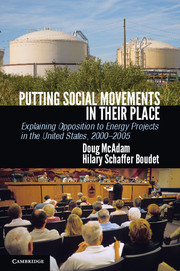 Putting Social Movements in their Place
Putting Social Movements in their Place Mobilization and Project Outcome
Published online by Cambridge University Press: 05 June 2012
In the previous two chapters we showed that there was considerable variation in mobilization across our twenty communities. In this chapter we turn our attention to the all-important issue of “movement outcomes.” At the heart of the chapter is a single, stark, research question: does the aforementioned variation in mobilization help us understand the ultimate fate of the proposed projects? To answer the question, we look at three different “outcome” measures. The first is whether the project was rejected during the regulatory review process. The second is the opposite of the first, whether the project was approved during the regulatory review process. The third – a very different outcome – is whether the project was ultimately built.
Given the exceedingly modest levels of contention that we found across our cases, we were frankly expecting to see little affect of mobilization/nonmobilization on project outcomes. Taken together, however, our results show a surprisingly strong imprint of mobilization/nonmobilization on the ultimate fate of the projects. Three specific findings bear mention. The strongest relationship is a negative one: the failure of a community to mobilize is, in and of itself, sufficient to explain project approval. Although the converse is not true, mobilization is an important component of the recipes explaining project rejection. The outcome that shows the weakest relationship to mobilization/nonmobilization is whether the project is ultimately built. This makes sense. The decision to build a project depends on a host of factors – most importantly in our cases, the variable health of the relevant energy market at the time of construction – other than level of opposition. Still we will include all three measures in our analysis. But we are getting ahead of ourselves. Before we dig into the data, we want to review the curious history of research – or lack thereof – into this seemingly most important of research questions.
To save this book to your Kindle, first ensure [email protected] is added to your Approved Personal Document E-mail List under your Personal Document Settings on the Manage Your Content and Devices page of your Amazon account. Then enter the ‘name’ part of your Kindle email address below. Find out more about saving to your Kindle.
Note you can select to save to either the @free.kindle.com or @kindle.com variations. ‘@free.kindle.com’ emails are free but can only be saved to your device when it is connected to wi-fi. ‘@kindle.com’ emails can be delivered even when you are not connected to wi-fi, but note that service fees apply.
Find out more about the Kindle Personal Document Service.
To save content items to your account, please confirm that you agree to abide by our usage policies. If this is the first time you use this feature, you will be asked to authorise Cambridge Core to connect with your account. Find out more about saving content to Dropbox.
To save content items to your account, please confirm that you agree to abide by our usage policies. If this is the first time you use this feature, you will be asked to authorise Cambridge Core to connect with your account. Find out more about saving content to Google Drive.